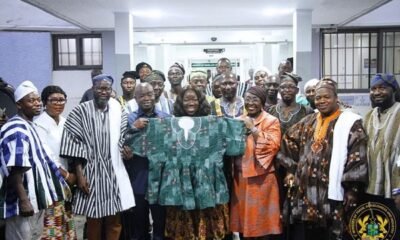Hot!
‘Don’t use COVID-19 as excuse to stop attending child welfare clinics’

Following the outbreak of COVID-19 and the rising number of cases in the country, health experts say there has been a decline in the number of nursing mothers who are supposed to attend child welfare clinics.
According to practitioners, some mothers say they fear exposing themselves and their babies to the virus, hence the slow patronage in routine services.
However, the Head of the Neonatal Intensive Care Unit (NICU) at the Accra Regional Hospital, Dr Nana Okai Brako, believes mothers should not put up such excuses for themselves.
The paediatrician, speaking to The Spectator, said that different forms of post natal care remained an essential part of a child’s wellbeing, therefore, mothers should not use coronavirus as a cover up against attending child welfare clinics.
He maintained that mothers could still observe the necessary health protocols and take good care of their children in the wake of the pandemic.
Touching on jaundice as one of the common diseases in babies, he said that the disease still accounted for a chunk of out-patient admissions at the pediatrics department.
The month of May each year is set aside to create awareness on jaundice in newborn babies.
Though statistics were not readily available, Dr Brako noted that the effect of neonatal jaundice in babies could still be dire if not detected and treated early.
He explained Neonatal jaundice as the “yellowing of the eyes or the skin of a baby which is caused by increase in a substance known as “bilirubin” in the baby’s bloodstream.”
He noted that the condition occurred within the first 28 days after a baby is born, adding that, the disease had varied effects on babies, including visual and hearing impairments as well as brain disorders.
“The first two weeks is very critical when it comes to detection and treatment of neonatal jaundice and it is one of the conditions mothers must look out for,” he said.
Differences in blood group between the mother and baby, infections and the use of camphor by some mothers, he noted, were among the causes of jaundice in babies.
Dr Brako, also the Focal Person of New Born Care in the Greater Accra Region, therefore advised mothers to always bring their babies out to properly lit areas for early signs of neonatal jaundice.
He further urged mothers to ensure their children were vaccinated against preventable diseases at the hospitals and child welfare clinics.
“Mothers should try to keep their babies warm at all times and also abide by the exclusive six months breastfeeding guideline as recommended.
“Babies should only be separated from their mothers only when mothers, due to a peculiar condition, are too weak to handle them,” he stressed.
Mothers, he said, should expect that they would be admitted at the hospital when they came to hospital with signs of jaundice in their babies.
Dr Brako insisted that nursing mothers should follow appropriate safety precautions and continue to breastfeed their babies as efforts were being made to combat the pandemic.
By Ernest Nutsugah
Hot!
Annoh Dompreh raises alarm over DACF arrears, calls for payment of contractors

The Member of Parliament for Nsawam Adoagyiri, Frank Annoh Dompreh, has expressed concern over delays in the release of the District Assemblies Common Fund, warning that the situation is stalling development across the country.
On his facebook page, he described as a matter of urgent national importance, the Minority Chief Whip pointed to what he sees as a growing crisis of unpaid contractors, abandoned projects, and halted infrastructure works in many districts.
He noted that several communities are grappling with half completed schools, unfinished health facilities, abandoned markets, deteriorating roads, and stalled sanitation projects.
According to him, many contractors who have executed projects for district assemblies have not been paid, forcing some construction firms to demobilise from sites while workers lose their jobs.
He stressed that the District Assemblies Common Fund is not a discretionary allocation but a constitutional requirement under Article 252 of the 1992 Constitution, intended to support development at the local level.
In his view, years of delayed releases and accumulated arrears have weakened district development financing and disrupted projects meant to improve living conditions in communities.
He further argued that some payments made in recent years were largely the settlement of old debts rather than funding for new or ongoing projects, a situation he believes has affected contractor confidence and local economic activity.
He described the issue as more than a budgetary challenge, characterising it as a development emergency and a governance concern.
He therefore urged the appropriate authorities to pay outstanding DACF arrears, settle contractors who have completed their work, and ensure that transfers to districts are automatic and predictable.
He maintained that decentralisation can only succeed when district assemblies receive adequate and timely funding to carry out development projects.
He emphasised that stalled projects directly affect ordinary citizens, since they rely on such infrastructure for education, healthcare, transportation, sanitation, and economic activities.
He called for renewed attention to grassroots development, insisting that national progress should not be concentrated only in major cities but extended to all communities.
By: Jacob Aggrey
Hot!
Breaking: Footballer who killed two children in Abesim handed lifetime sentence

Richard Appiah, the footballer who killed two children and stored part of their bodies in a fridge at Abesim in the Bono Region in 2021 has been handed a lifetime sentence.
This was after a five member panel of judges at the Accra High Court returned a verdict of guilty against the convict.
Appiah, 32, also a draughtsman would spend the rest of his life in prison after he was convicted of murder.
More more more
BY MALIK SULLEMANA






